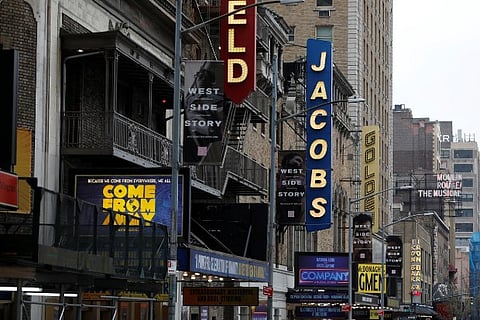

Chennai
But a life in the theatre is built on exactly that kind of blind confidence, and I’ve spent my life pretty much always looking forward to whatever was the next thing: the next role, the next milestone, the next great show to see. Now, because of the coronavirus, we’re facing a future that sure feels more tenuous and fragile than ever. Projects have been cancelled, milestones have already been missed, and all the shows have gone dark. These are hard times, and in hard times I, like so many others, have turned to the theatre for comfort. Where do we turn now?
To non-theatre lovers, lamenting the closing of Broadway in the face of so much widespread suffering may seem, at best, frivolous. But for many of us, this tragedy has been made that much more devastating by having to face the nightmare without the laughter, tears and sense of community that a night in the theatre delivers. When politicians talk about the power of Broadway in tough times they often speak in purely economic terms. After the Sept 11 attacks, Mayor Rudolph Giuliani made his interest clear when he told the nation: “If you really want to help New York City, come to New York. Go to a play. Spend money in New York City.”
It is big business, to be sure. It’s a point of pride that Broadway is New York City’s top tourist destination, drawing more ticket buyers in the 2017-18 season than all of the tristate area’s sports teams combined. But by focusing solely on “money, money, money,” we diminish playgoing’s deepest value. When the theatre reacts in real time to current events, it has a unique ability to comfort and lead us through difficult times.
The only other public health emergency in my lifetime that recalls this pandemic, both because of the terror surrounding it and the failure of our elected officials to contain it, was AIDS. When The Normal Heart, Larry Kramer’s dramatisation of the early days of that crisis, premiered at the Public Theatre, it was 1985, near the height of paranoia about AIDS. Shortly after the play’s opening night, the actor playing the role of Ned Weeks, Brad Davis, found out he was positive and fell ill.
Joe Papp, the producer, called and asked me to take over the role, which called for an onstage kiss between Ned and his lover. My doctor — who did not yet know exactly how the disease could and could not be transmitted — advised me not to take the job because of it. I’ve never been particularly good at following doctors’ orders, and in this case, for me, the notion of backing out was unthinkable; I was already committed and felt an urgent need to be a part of telling this story. But the fear that came from that misinformation was there nightly.
The theatre provides a fundamental way in which we process pain and learn to heal. And now, in this moment of such great loss and confusion, where do we go? Publicly, our analogue art form has gone digital — play readings over Zoom, musical performances via Instagram Live and the proliferation of new podcasts. Theatre people are nothing if not resourceful when it comes to reaching an audience.
I’m taking comfort in the thought that at hundreds — maybe thousands — of desks around the world right now, great playwrights with too much free time on their hands are unleashing their wisdom, their fury and their boundless compassion upon the challenges we face. We may just have to wait a little longer than usual for the relief and understanding that all of that important work will provide.
-Grey is an Oscar and Tony Awardwinning actor-director. NYT© 2020
Visit news.dtnext.in to explore our interactive epaper!
Download the DT Next app for more exciting features!
Click here for iOS
Click here for Android